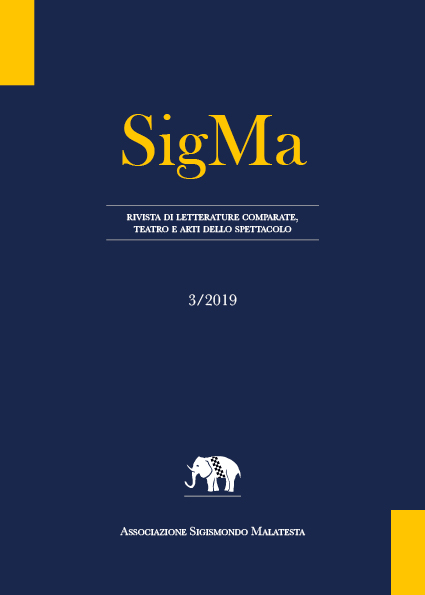La lingua che salva: memorie del quotidiano in Elias Canetti e Natalia Ginzburg
Abstract
Scopo del presente studio è un’analisi comparata di due racconti che hanno eletto il concetto di ‘quotidiano’ a soggetto della propria narrazione: Lessico Famigliare di Natalia Ginzburg (1963) e La lingua salvata. Storia di una giovinezza di Elias Canetti (1977). La quotidianità familiare descritta da Canetti e Ginzburg è una quotidianità vissuta due volte: la prima da spettatori inconsapevoli, bambini animati dal desiderio di comprendere e entrare in quel mondo dei grandi dal quale sono circondati imitandone i suoni e le parole pur non capendole; la seconda da registi assoluti, ripetendo il gioco mnemonico di chi ha osservato e udito, ma possedendo l’onnipotenza di attuare una scelta su cosa narrare, diventando protagonisti e narratori della propria storia. Lo studio si propone di analizzare molteplici elementi: partendo dalla funzione della parola come marcatore della quotidianità e del ricordo ‘operatore mnestico’, volendo utilizzare una felice definizione di Cesare Segre, il linguaggio segreto e incantato delle due comunità familiari sarà analizzato affiancato a riflessioni sulla filosofia del linguaggio e in particolare alla funzione del linguaggio quotidiano nel romanzo, focalizzandosi in particolar modo sulle figure genitoriali descritte nei due testi. Successivamente si prenderà in analisi la struttura delle due narrazioni e in particolare la dicotomia tra parola e silenzio, paragonando l’epicizzazione del quotidiano e l’esplicita intenzione di far passare sotto silenzio eventi personali o storici traumatici o di ridurli, appunto, al ricordo di singole parole che risuonano e che ricordano l’evento.
Downloads
SigMa pubblica in internet, ad accesso aperto, con licenza:
|
|
CCPL Creative Commons Attribuzione |
L'autore conserva il copyright sul suo contributo, consentendo tuttavia a chiunque "di riprodurre, distribuire, comunicare al pubblico, esporre in pubblico, rappresentare, eseguire e recitare l'opera", purché siano correttamente citati l'autore e il titolo della rivista. L’autore, al momento della proposta di pubblicazione, è inoltre tenuto a dichiarare che il contenuto e l’organizzazione dell’opera è originale e non compromette in alcun modo i diritti di terzi, né gli obblighi connessi alla salvaguardia di diritti morali ed economici di altri autori o di altri aventi diritto, sia per testi, immagini, foto, tabelle, sia per altre parti di cui il contributo può essere composto. L’autore dichiara altresì di essere a conoscenza delle sanzioni previste dal codice penale e dalle leggi speciali per l’ipotesi di falsità in atti ed uso di atti falsi, e che pertanto Reti Medievali è esente da qualsiasi responsabilità di qualsivoglia natura, civile, amministrativa o penale, e sarà dall'autore tenuta indenne da qualsiasi richiesta o rivendicazione da parte di terzi.

